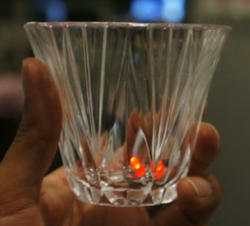Taking a Cue from Cubes
-
-
slice.mit.edu
Filed Under
Recommended

One Friday evening last November, Media Lab research assistant Dhairya Dand attended a party. The next morning he awoke in a hospital—the result of too much alcohol the night before.
Shaken by the incident, Dand took a unique approach to make sure that incident would not happen again. The result: Cheers, pseudo-ice cubes that can calculate how fast and how much alcohol one is drinking.
A video created by Dand tells his story and shows Cheers in action. On the first drink, the cubes blink green. On the second, they blink yellow, which indicates drinking too much or too fast. If the drinking continues, the cubes flash red, signaling the drinker to stop. If the drinker continues past red, a custom text message can be sent to a friend alerting them of the situation.

The cubes are made from a coin cell battery, an ATtiny microcontroller, and IR transceiver, which are molded into a waterproof cube. They cost about $50 to produce and are currently not available for sale. Dand has no plans to patent his invention.
From ABCNews.com:Cheers is not Dand's first unique research project. According to his website, his work specializes in superhuman interaction and his projects include Jellow, a communication device for children with cerebral palsy, and ThinkerToys, which converts discarded electronics into educational toys."I believe in open-source. My inventions are open to be hacked, developed and played around," said Dand. "True innovation is like ideas with wings, once they take birth in a mind, nothing, not even the inventor, can stop them."
Cheers is not a substitute for responsible alcohol consumption and might require a few details (like the drink's alcohol percentage) to be fully effective. But could these cubes serve as a deterrent to over-imbibing? Let us know in the comments below or on Facebook.
As Dand notes in his video, call 617-253-121 for any alcohol-related emergencies at MIT. In accordance with MIT's practice for seeking help, MIT will treat the situation as a health and safety matter and not a disciplinary incident.







